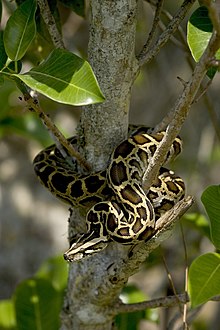Conservationists capture most massive Burmese python in Florida history
Saturday, June 25, 2022

Image: NPS.
Media reported Wednesday that biologists from the Conservancy of Southwest Florida reported having captured a Burmese python (Python bivittatus) measuring nearly 18 feet (5 m) in length and 215 pounds (97 kg) in weight in the state's Everglades wetlands.
It may be the largest member of its species ever found outside its natural range in Southeast Asia. Another Burmese python measuring 18 feet and 9 inches (5.7 m) was found in 2020, but it only weighed 104 pounds (47.2 kilograms).
In a search documented by National Geographic, the team captured the current snake in December 2021 by tagging a male "scout snake" named Dionysius with a GPS tracking device and releasing it into the western Everglades.
"How do you find the needle in the haystack? You could use a magnet, and in a similar way our male scout snakes are attracted to the biggest females around," said wildlife expert Ian Bartoszek, the team's project manager.
Pythons are an invasive species in Florida. Removing female snakes from the environment before they lay their eggs is the Conservancy's preferred strategy for limiting python breeding. When the team saw that Dionysius was spending several weeks in one area, they concluded he'd found a sexually mature female and set off to retrieve him.
It took twenty minutes of wrestling and three adult humans to carry the snake to a vehicle, in which it was taken to a laboratory in Naples, Florida and euthanized. Upon necropsy, it was found to contain over 122 healthy but unfertilized egg follicles.

Image: USGS.
Pythons were introduced to Florida in the 1970s, probably by being sold as pets. While there is a history of individual pet owners illegally releasing exotic animals into the wild after they grow larger than expected, the destruction caused by Hurricane Andrew in 1992 also allowed animals from a serpent center to escape to the Everglades and other habitats, where they reproduced in great numbers.
Since then, they have disrupted the food chain by eating local animals, including endangered animals: the stomach of this snake contained the remains of a white-tailed deer.
The state of Florida considers Burmese pythons a threat to native wildlife and sponsors an annual python hunt with USD2,500 as first prize.
Sources
- Associated Press. "Portly python: heaviest-ever snake captured in Florida tips scales at 215lbs" — The Guardian, June 22, 2022
- Tom Hale. "Record-Breaking 18-Foot Whopper Is Heaviest Burmese Python Ever Caught In The US" — I Fucking Love Science, June 22, 2022
- Dac Collins. "Largest Python Ever Captured in Florida Is Nearly 18 Feet Long" — Outdoor Life, June 21, 2022
- Rebecca G. Harvey, Matthew S. Brien, Michael Dorcas, Michael Rochford, Ray W. Snow, Frank J. Mazzotti. "From Pets to Invasive Predators: Burmese Pythons in the Everglades" — University of Florida, April 2009
